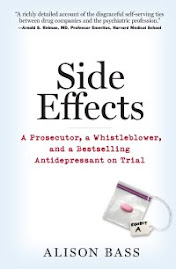I've been experiencing a strong sense of deju vu ever since Gardiner Harris' story in The New York Times earlier this week that GlaxoSmithKline hid negative findings about a bestselling drug and misrepresented data in a clinical trial of the drug. This time, the drug is Avandia for diabetes, and there is evidence that Glaxo not only knew the drug increased the risk of heart attacks in patients and suppressed the data for 11 years. But according to The Times, the company also omitted cases of patients who were taking Avandia and suffered serious heart problems in the trial's tally of adverse events.
Where have we heard this before? As I revealed in Side Effects two years ago, GlaxoSmithKline pulled the same shenanigans with its blockbuster antidepressant, Paxil. Not only did the drug manufacturer suppress negative findings about the safety and effectiveness of Paxil in treating depression in children, but in one of the clinical trials it conducted of Paxil in the mid-90s, there is evidence that researchers actually omitted from the final study results, cases of adolescents who became suicidal after taking the drug. I revealed this pattern of deception in Side Effects and in subsequent blogs here and here.
Side Effects is essentially the story of how the New York State Attorney General's office uncovered GlaxoSmithKline's chicanery and sued the drug company, forcing it to publish the results of all of its clinical trials, negative as well as positive. Which is why it's so good to see one of the players in that 2004 drama -- Eliot Spitzer, who headed the AG's office at the time -- weigh in on the whole saga in Slate today.
The irony is that if Spitzer and his crew had not forced GlaxoSmithKline to post all of the clinical trial data on a public website, Dr. Steven Nissen, a cardiologist with the Cleveland Clinic, would never have been able to gather the data necessary to show, in a groundbreaking 2007 meta-analysis, that Avandia does cause an increase in heart problems. And the company's subterfuge would never have been revealed.
Now, of course, the ball is in the FDA's court. A split advisory panel yesterday recommended that Avandia should either be withdrawn from the market or have sales severely restricted because of its heart risks, according to The Times.
And just today, GlaxoSmithKline announced that that it would take a second-quarter charge of $2.36 billion to settle legal cases involving its drugs, Avandia and Paxil, again according to The New York Times Given that the company has been pocketing enormous profits for both of these blockbluster drugs for more than a decade -- last year alone, it made a total of $8.4 billion -- that's not exactly a ruinous sum. Even so, I'm sure GlaxoSmithKline's stockholders will not be happy with the news.
We can only hope that GSK and all the other drug companies who have practiced similar deceptive tactics over the years are finally getting the point: Crime doesn't pay.
Thursday, July 15, 2010
Subscribe to:
Posts (Atom)


